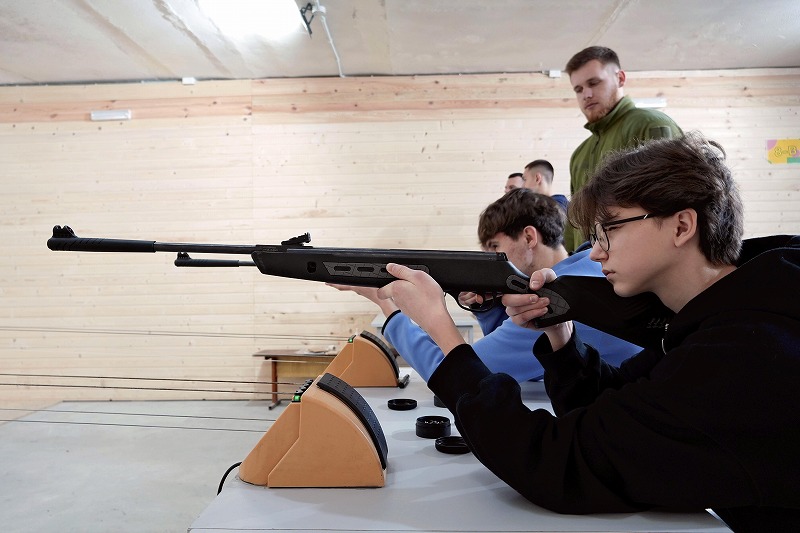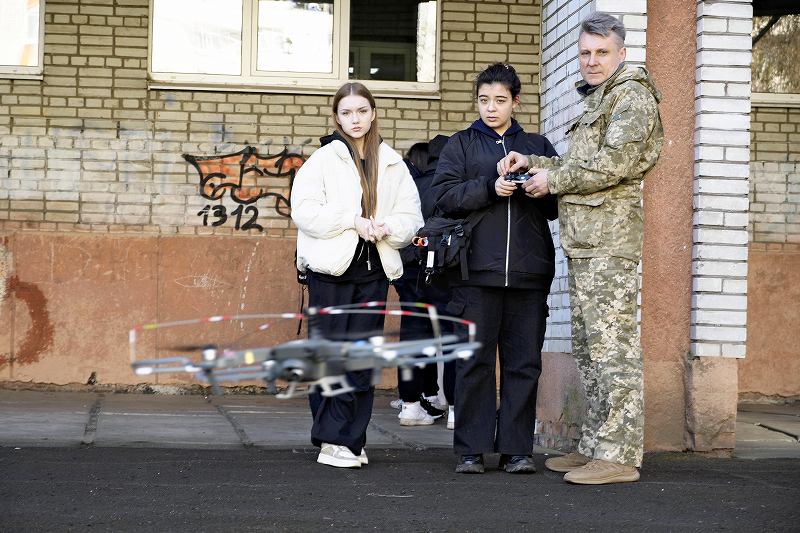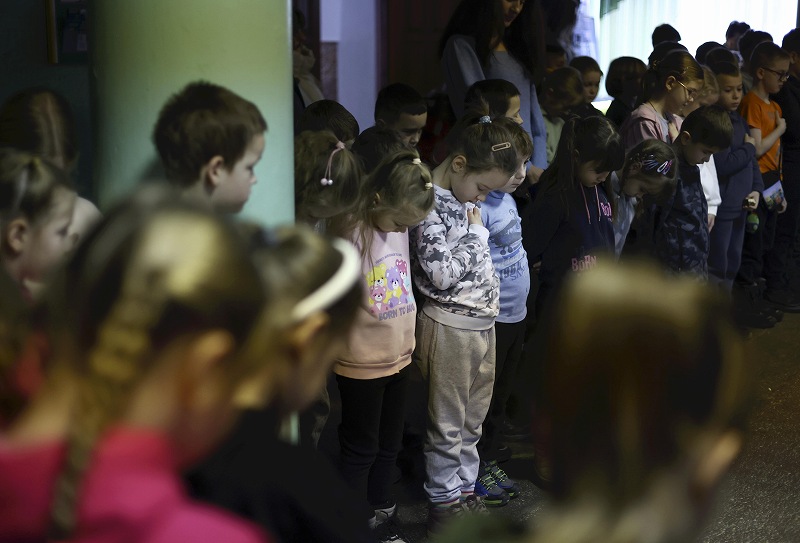Conflict with Russia Deeply Impacting Education in Ukraine; ‘Patriotic Education’ Aims to Boost Defense

Students receive gun training at a school in Lviv, Ukraine.
11:55 JST, February 26, 2025
LVIV, Ukraine — In Ukraine, where Russian aggression is ongoing, the war’s impacts have deeply affected educational activities.
Students are trying to acquire the skills and determination needed to prepare for combat in the future, potentially to fend off attacks from the Russian military.
In the Center for Patriotic Education inside a public school in Lviv, Ukraine, a shooting range has been built in an underground shelter.
In late January, first-year high school students from nearby schools gathered at the range. They skillfully loaded lead pellets, several millimeters in diameter, into air rifles and brought the guns to bear.
An instructor dispatched from the military advised the students, “Close your left eye and line up the sight just below the target.”
Listening to the instructor, the students fixated with one eye on their targets 10 meters away and squeezed the triggers. The serious expressions on their faces did not relax, regardless of whether they hit the targets.
Last year in Ukraine, a school program called the “Defense of Ukraine,” in which students learn the basic skills needed for soldiers, became a compulsory subject for high school students.
For about eight hours every month, students learn how to use guns and operate drones.
Though some municipalities are scheduled to begin the training classes from the next school year, the subject has already been entrenched in Lviv. There are currently 13 centers for patriotic education in the city.
The students who received the training class on the day originally began in September.
The 23-year-old instructor, Nazariy Buryak, was surprised to see the students’ growth and said, “Initially, they were afraid of even holding guns, but now they can hit the targets very well.”
After shooting drills, Tares Matviev, 15, shyly spoke with me in Japanese, asking, “Hello, are you from Japan?” He said he dreamed of going to Japan and was studying Japanese.
However, he faces the reality of continued Russian military aggression. Matviev said the military training was meaningful.
He showed a stern expression and said, “I may be conscripted in a few years. To prepare for that time, I want to build up warfare knowledge and skills.”
The Defense of Ukraine program in high schools also reflects the frontline situation.
The aim of the program is not only to help students acquire military skills but also to lower their feeling of hesitation against conflict and prevent them from trying to escape conscription obligations in the future.
Teaching UAV control

Students in Lviv, Ukraine, on Jan. 29, learn how to control an unmanned aerial vehicle, using one which had actually been utilized on the front lines.
“This is a ‘retired veteran’ which actually operated on the front lines,” Vitaliy Bondarenko, 47, a military training instructor, said to students on the grounds of a school in western Lviv.
He showed the students an unmanned aerial vehicle, entrusted to him by a fellow soldier, and began their training.
The UAV moved with just the slightest shift of a joystick on its controller.
Adriana Dzhura, 16, said, “The classes made me burn with patriotism, and I want to join the military in the future.”
The Defense of Ukraine program was created based on national defense classes, which had been offered before, based on the current Russian aggression.
Subjects students learn through the classes include information security and methods for rescuing the wounded.
Program instructors have been rapidly prepared for lessons. Bondarenko himself flew a drone for the first time only seven months ago.
Initially, protests were raised over the program. Some criticized it, saying, “Are you going to teach students how to kill?”
Halyna Pyza, 49, principal of the school, persuaded parents and guardians in discussions of military training classes, saying, “The program will be necessary for students to preserve their own lives.”
In Ukraine, many have fled military conscription obligations, and the need to secure military recruits has grown more urgent.
Pyza said, “The classes are also necessary to get the next generations to fight to protect our nation instead of flee overseas.”
Minute of silence observed

Students observe a minute of silence before the start of the day’s classes in Lutsk, Ukraine, on Feb. 13.
Efforts to raise students’ patriotism and sense of national defense are being built into regular school life.
In Lutsk, a city in western Ukraine, a minute of silence began in a public school on Feb. 13, immediately after a chime sounded at 9 a.m. Students placed their hands on their chest and closed their eyes.
The minute of silence was established across the country in October 2023 to express gratitude and respect toward soldiers.
Though the scene is not so common across the town itself, it is observed every day in schools.
When the silent tribute ends, teachers shout, “Glory to Ukraine,” and students loudly say, “Glory to our heroes.”
Battlefield camouflage nets are spread out along school building corridors.
Students at the school voluntarily began making the nets in autumn 2022, and the school has donated over 100 nets to the military.
Daryna Havryluk, 12, who lost their 41-year-old father on the front line in September, said, while working, “I don’t want my friends to lose their fathers. I want to help, even a little, to end this war in victory.”
Top Articles in World
-

China Confirmed to Be Operating Drilling Vessel Near Japan-China Median Line
-

China Eyes Rare Earth Foothold in Malaysia to Maintain Dominance, Counter Japan, U.S.
-

Japan, Qatar Ministers Agree on Need for Stable Energy Supplies; Motegi, Qatari Prime Minister Al-Thani Affirm Commitment to Cooperation
-

North Korea Possibly Launches Ballistic Missile
-

10 Universities in Japan, South Korea, Mongolia to Establish Academic Community to Promote ICC Activities, Rule of Law
JN ACCESS RANKING
-

Univ. in Japan, Tokyo-Based Startup to Develop Satellite for Disaster Prevention Measures, Bears
-

JAL, ANA Cancel Flights During 3-day Holiday Weekend due to Blizzard
-

China Confirmed to Be Operating Drilling Vessel Near Japan-China Median Line
-

China Eyes Rare Earth Foothold in Malaysia to Maintain Dominance, Counter Japan, U.S.
-

Japan Institute to Use Domestic Commercial Optical Lattice Clock to Set Japan Standard Time
























